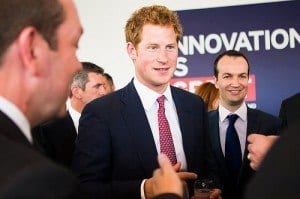
Guitarist Zach Filkins shares all the right things to get big
When hearing its first tunes, most people immediately recognize the 2007 radio hit “Apologize.” While the most recognized version was a remix by Timbaland, it’s the song that made OneRepublic and their debut album “Dreaming Out Loud” a worldwide hit. Led by Ryan Tedder on vocals, the band’s members include Zach Filkins on guitar and backing vocals, Drew Brown on guitar, Brent Kutzle on bass and cello, and Eddie Fisher on drums. For these five fellows who first shot to fame on MySpace, success has been a surreal experience. “All the Right Moves,” the lead single from their second album “Waking Up,” has shot this band even further to the top. Guitarist Zach Filkins shared his thoughts on the band’s success, plans for a third album and his own journey.
What’s the band doing these days?
Well, obviously after the first album, we all kind of wondered how long it would last. So far we’ve been able to keep things going, in Europe and in the U.S. It’s been great, they still want to hear us, so that’s good. We recently decided that we’ve been touring this album for about a year and a half, almost two years, and it’s time to get off the road, start recording again and get our music out. I feel that every time, at least for us, when we decide to get off the road to make music, we’re kind of excited. We forget that we can stop for a little bit and put more music out. That’s where we’re at right now.
How did you pick the name OneRepublic?
We really wanted a name that meant something to us. It started out as Republic because Ryan was looking at a globe one day and saw “republic,” and we thought, “Yea, the word ‘republic’ is not only unifying but it’s also universal.” So we started with that and then one day we Googled “republic” and there were so many things that we knew we would never pop up first. We’d have to compete with international banks and stuff like that. So we thought we should specify it a bit more and we changed it to OneRepublic.
Out of the major singles that you’ve had in the last few years, “Apologize,” “Stop and Stare,” and “All the Right Moves,” which one is your favorite and why?
Out of all of those, I think “Stop and Stare” is my favorite for many reasons. After “Apologize,” we were really wondering whether people recognized us, or whether it was just the Timbaland involvement. With “Stop and Stare” and its success, I think we were all relieved. I mean, no one sets out to be a one hit wonder and “Stop and Stare” was really a turning point for us. On the other hand, the song is really about being in a place that you never know if you’re going to get out of. Being in LA, it’s so fast paced, and everyone seems to be doing exciting things at once. Being in an environment like that, wondering if your music is ever going to be anything, or if you’ll have to drag your ass back home and figure out what else you can do. “Stop and Stare” is really all about that fear.
Are you getting sick of hearing “Apologize” all the time, and being asked about it so much?
No. There’s something about “Apologize” that somehow never wears for me. I’m not tired of playing it but I do think we should play it differently, range it up a little. We played that song in a similar way for probably five years now.
This probably won’t surprise you because “Apologize” was such a huge radio hit, but it’s one of my favorite songs and I listen to it on my iPod all the time. What’s this song really about? Who’s the person that should apologize?
I think Ryan wrote it about that story that happens in relationships. Many times, there’s one person who’s more involved in the relationship and committed than the other, and then the other will end up leaving. It’s the classic heartbreak story. But many times, that person will come back and say, “I know I left, I should have stayed,” and at that point it is kind of too late to apologize. It’s a, “You had your chance,” kind of thing. Ryan had a couple of relationships like that in college. The girl thought she needed more of a bad boy, and two weeks later she came back crying, “Maybe we should go on a date again,” and Ryan is like, “No, of course not.” That’s kind of the personal aspect, but the song can mean anything. It’s really just about empowerment, and the person who should apologize is anyone who thinks of toying with someone else’s feelings. That’s never right.
What was the impact of collaborating with Timbaland for that song? What other artists would your band want to work with?
The Timbaland thing was strange. Before we even became a band Timbaland saw Ryan, thought he had talent, and took him under his wing. That was back in the day. He kept and eye on us on MySpace, saw that we were going in circles during our third or fourth year in LA, and he wanted to help us. His thought was to remix the song and put it on his personal album and at the same time us on our own with our own album. So he was helping us get out in the scene. As it turned out, the “Apologize” remix became a massive hit worldwide. It was never supposed to be that way.
We go in circles around other artists we want to collaborate with. We’re always thinking something different. We thought about recording an album and collaborating with current artists from all the different countries that we’ve visited, which I think would be kind of cool.
Would you sing in different languages then?
I think we’d probably let them do it (laughs). There was a song, “Say (all I need),” that had a lot of success in France, so Ryan recorded the first verse in English and then a French artist sang the second verse in French. It was beautiful, absolutely beautiful.
What was your reaction when you learned that the only song that “Apologize” beat on the charts was Leona Lewis’ “Bleeding Love,” which was actually co-written by Ryan?
(Laughs) I think we were all thinking ‘nice job,’ but we were also a little bit bitter. It’s a combination of being happy for Ryan and at the same time, it’s like you kicked your own self off the charts. It’s really weird.
My favorite song from your most recent album, “Waking Up,” was “Secrets.” Tell me a little about that song and the story behind it.
That’s my favorite song too. It’s a song that sort of came about because we wanted to accentuate the unique aspects of who we were. At that point, we realized, we’re going to have Brent play the cello, and I started learning the viola. But at the same time, we listen to pop music, classical music and hip-hop music. So it’s kind of a weird combination of what we’re into. As soon as I heard it, I knew it was probably going to be one of the best songs on the album. I could feel that song more than any other song on the album, and I think music is at least 50 percent how you feel. It went from there. We got to work with Ralph Lauren, who wanted to use “Secrets” to launch a fragrance, and it’s been featured in a couple of movie soundtracks. It’s just that kind of song.
Tell me about living in Spain as a child and how you were influenced by Spanish music.
Living in Spain was a lot of fun. I still don’t realize how much input that experience left on me because I was just young enough to kind of think ‘Oh yeah, I’m in a different city, different country,’ but I didn’t really get it until we were leaving and I was 14, 15. That’s when I really knew the difference. Spanish music is very passionate and I think it was more passionate then than it is now. They’re not trying to hide things or be super cool; they’re kind of just out there with their emotions. Spanish music is a lot like that, especially Flamenco and Spanish-style classical guitar, which is what I started learning when I was nine. Flamenco music is all about family and passion, and the whole storyline of emotion, from anger, sadness and frustration, to love and pain. That really connected with me. I tend to gravitate more toward melancholy music, which is weird because I’m not a melancholy guy at all, but I always gravitate more to sad music and Spanish music can tend to be more on that side of things. As a result of all that, any guitar parts or guitar work that’s melancholy, ethereal or emotional, that’s what I like. I only like angry guitar music when I’m working out (laughs).
In college, you majored in aeronautical engineering, which isn’t too similar to what you’re doing now. Why such a drastic career change?
(Laughs) Yeah, it’s different. I made the switch from aerospace engineering into kinesiology and education, and from there I left it all and finished. I wanted to be a few things but one thing I learned about aerospace engineering is that there are many degrees that once you graduate with them you have to go 100 percent into that career choice. You can’t really do it part-time, and I always had four or five different interests going on at once. It was hard for me to focus on engineering; it’s kind of like being a part-time med student, you really can’t do that. I finally realized that I was probably wasting a good amount of my parents’ money and I should make a decision before I go any further into it. I feel like I still have an engineering mind but I don’t really like committing 100 percent to one career choice.
You also worked as a model for a while, tell me about that experience.
I had friends saying that I should do it and I decided to go to an open call almost to prove them wrong. At the same time, I did want to try it, and I was young, so I thought I might as well. I went to this open call and I was actually really popular, so I decided to move to Chicago and work there for a while. That lasted for a good two, three years, and it was fun. At that age, I was up for whatever. It was nice to get that out of my system I think. It’s not really a good career choice for me but it was a fun thing for a while.
What advice would you give to college students who keep changing their minds about what they want to do?
Number one, make sure that you always remember that everything in the class you go to is paid for, either by your own money or by your parents’ money. If I had realized that, I probably would have been more deliberate about what I was doing, because now if I purchase something, I want to get my full use out of it. I want to pay good money and I want 100 percent back. Then in terms of career changes, it’s always best to know yourself and to keep learning about yourself so that you waste less time, less energy and less money. Don’t feel bad about it. Don’t feel like you’re stuck. If you’re a sophomore in pre-med and you’d much rather be an artist, then switch to what will make you happy.
What’s your best memory from your college years?
Probably the time that I spent in the dorm with my friends. I was lucky to have a whole dorm floor of amazing guys. We all became very close. We would do some crazy stuff and we all just hung out as brothers. The human bond we formed and trying to fit everyone in the shower all at once was fun, stupid stuff like that.
What advice would you give to college students who want to start a band?
The advice we always give is if you want to be successful, you really have to get to know your fans and figure out what they want. At the same time, be true to yourself musically. It’s kind of a combination, being true to yourself and writing music that fans will want to hear. In today’s music industry, no one does anything for you; you’re all on your own. If you’re lucky enough to have a record label or management company that wants to work with you then good. But until then you have to do all the promotions yourself, you have to get online, you have to play and promote shows on your own, you have to develop your music on your own. That’s a hard thing, there’s a lot of competition. It’s all about song writing and promoting yourself with your own resources.
Tell me about the impact of the Internet and technology on the success of OneRepublic.
The Internet is 100 percent what you need to be successful. You can have songs on the radio but if someone likes that song on the radio, they’re just going to purchase it on iTunes. So in order to cause someone to commit to you as a band, as an artist, which in turn will cause him or her to buy your album and to see you live, you need to be on the Internet. That’s where everyone goes to connect now.
Speaking of the impact of the web and technology, I remember when I was a kid MTV was all music videos and now it’s mostly Reality TV. Do music videos still matter?
Yes, good question, they definitely matter. We grew up watching MTV as well until it started with all the reality. Music is not only meant to be listened to, it’s meant to be watched. It’s always been that way, especially a long time ago when there was no way to record something and listen back to it with any sort of speaker, so it was performed. People went to hear it, but also to see it. It’s always going to be that way. Music videos are not gone; it’s just a different format. Just like any other aspect of the music industry right now, it’s more about what the consumer wants. When we watched MTV, we watched whatever video they played us and had no choice in the matter. Now it’s just a new thing, you go to YouTube and watch what you want to watch, when you want to watch it. If I want someone to make a choice for me, I’ll watch VH1 where they have that countdown, but there are different avenues now. If we don’t rely on MTV, we go somewhere else.
I have one question left, and it’s more of a fun thing. Describe yourself and each of your band mates in one word.
Ryan is busy. Brent, I would describe him as a caricature or cartoon. Drew is clever. Eddie is ready; he’s always ready for the next thing. I am active.















